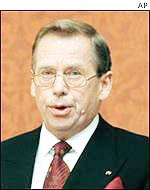PRAGUE, (Reuters) – International leaders bade farewell yesterday to former Czech President Vaclav Havel, the anti-communist dissident who led the peaceful “Velvet Revolution” and inspired human rights campaigners around the world.

U.S. Secretary of State Hillary Clinton and her husband former President Bill Clinton, joined leaders from France, Britain and many ex-communist countries for the funeral mass in the gothic St. Vitus cathedral at Prague Castle, the seat of Czech kings and presidents.
Havel, a dissident playwright who died on Sunday at 75 after a long respiratory illness, served five years in jail for his criticism of oppressive communist rule before rising to the presidency of what was then Czechoslovakia in late 1989.
He stepped down as Czech president in 2003 but remained a symbol of struggle for freedom and human rights, although his proclamation that “truth and love must win over lies and hatred” turned bitter to some Czechs amid economic hardship and corruption in the years after the end of totalitarian rule.
A thousand guests filled the monumental cathedral for the mass, while thousands more followed the service on large screens outside.
“He fought against the communists, stuck to his opinion, made big sacrifices,” said 14-year old Anezka Chroustova, who brought a bunch of yellow roses.
Havel’s widow, actress Dagmar Havlova, clad in a black veil, sat in the front row at the mass celebrated by archbishop Dominik Duka, the head of the Czech Catholic church. Havel’s casket lay on the floor, covered by a Czech flag.
Sirens and church bells rang around the central European country at noon in Havel’s memory and many people stopped on the streets to observe a minute of silence, some moved to tears. Some factories stopped work.
On Wednesday, over 10,000 mourners had marched through Prague’s cobblestoned medieval streets, led by his widow, to pay their respects. Thousands of candles were burning at Prague’s Wenceslas Square and Narodni Trida, the main spots of the Velvet Revolution demonstrations.
POPE’S TRIBUTE
“Remembering how courageously Mr Havel defended human rights at a time when these were systematically denied to the people of your country, and paying tribute to his visionary leadership…I give thanks to God for the freedom that the people of the Czech Republic now enjoy,” Pope Benedict said in a letter read out at Friday’s mass.
Havel’s dissident friend Lech Walesa, the first post-communist democratic president of Poland, was among the guests. Russia, which Havel criticised for human rights abuses and democratic shortfalls as recently as this month, was represented by rights ombudsman Vladimir Lukin.
Bill Clinton’s presence was testimony to his close relationship with Havel, who took him to drink beer in a Prague pub and play saxophone in a club when he visited in 1994.
Havel developed close ties with the United States and took the Czech Republic to NATO in 1999 and the European Union in 2004.
“Vaclav Havel was fully aware of human weakness but we will remember him for his resolve not to accept it as a permanent state of being,” said Madeleine Albright, a Czech-born former U.S. secretary of state under Clinton and a friend of Havel.
The service ended with the Czech national anthem and 21 howitzer gun salvos. The crowd outside the cathedral clapped as Havel’s coffin was taken away for a private family memorial.
Havel, whose dramas of the absurd were popular in the 1960s before he was banned from public life after the Soviet invasion in 1968, had felt most at home among artists, including the Rolling Stones who played in Prague in 1990 just a few months after the revolution.
A rock concert and a festival of his plays was due to take place later on Friday at the Lucerna Palace that the Havel family built in the early 20th century. Four thousand tickets to the event were snapped up in minutes.
The programme includes a show by The Plastic People of the Universe, a band whose persecution in the 1970s led Havel and others to form the Charter 77 movement that became the main opposition platform.
